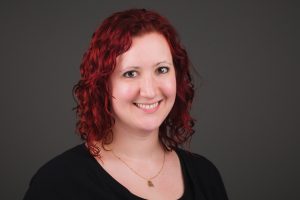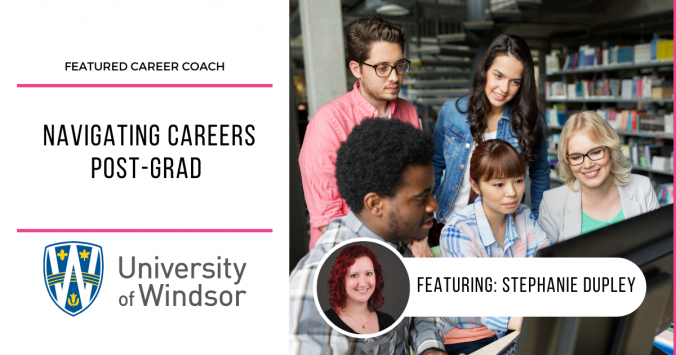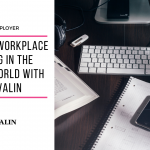No one should expect to come out of school and land their dream job on the first try. In this new world of hybrid job opportunities, the allure of remote careers and, for some, working in an office or on-site, we all need a little help in navigating the murky waters of our wants and needs. As a Career Advisor for International & Graduate Students at the University of Windsor’s Career Development & Experiential Learning (CDEL), Stephanie Dupley and her department serve students through appointments, workshops, events, and resources.
We had the opportunity to speak to Stephanie about her career and best practices for coaching students to land their first post-grad jobs and launch their careers!
 Q. Why did you decide to go into Career Education/Coaching?
Q. Why did you decide to go into Career Education/Coaching?
A. I didn’t initially decide to work in career development. Like many in the field, it was something I fell into. I graduated with my Bachelor of Education and landed a role at our local workforce development board. Lucky for me, they had some funding to hire an inexperienced new grad, so it was fantastic timing! My role there was to learn about career counselling and create a career education program for the youth in our community – something that was rather daunting for me at first, as I didn’t have any experience with career development in the past.
After learning more about the field, this feeling of intimidation about the subject became a genuine interest as I realized the importance of career development. I grew motivated to help people connect their education and training to the workforce and use all their unique skills. I started to develop this enthusiasm – “passion,” so to speak – that I didn’t know I had.
This first-hand experience with discovering a field I grew to love helps me when re-assuring students that it’s okay if they haven’t “discovered their passion” yet. I’ve met with students who have heard the “do what you love” and “follow your passion” cliches and are worried that they haven’t found that passion. I enjoy recounting my story to them and reminding them that passion is something that is developed.
Q. What is one of your most outstanding achievements in your work with students?
A. something that I love about my job is that I sometimes get to see the tangible results of my work. When students contact me to tell me good news (“I got an interview!”, “I got the job!”, “I got into medical school!”), it feels super rewarding. I actually keep a file in my email box dedicated to emails such as these from students. On days when I am feeling unmotivated or stressed (let’s face it, we all have those days sometimes), I look at these to help me remember why what we do is essential, and it energizes and motivates me.
Q. What would you like to achieve as a career coach in the future?
A. something I have been trying to become more educated on issues in career development regarding equity, diversity, inclusion, and decolonization (EDID). It’s essential to recognize that every career journey will look different, and many factors can affect that journey. I want to provide the best service possible to all student populations, meaning I need to learn as much about them as I can.
In CDEL, we are all in the process of learning more about this, as the department has provided professional development sessions on this topic. This has prompted us to review some of our resources to ensure they are more accessible and inclusive and has inspired us to want to learn more about and take actions to help equity-deserving populations.
Q. How do you help students in making their school-to-work transition? What new services or strategies have you employed to support students in a hybrid environment?
A. When the pandemic hit, we had to move all our services online, and we did so rather successfully (if I do say so myself). Now that we are transitioning to providing in-person service again, we have opted to provide online and in-person options for students. This way, students can get the information, resources, and support they need in a way that is most efficient and comfortable for them. We have had many discussions about how we can best provide service in both ways, and we have come up with some great solutions, such as allowing students to choose the mode of their appointment (online, phone, or in-person).
Some of our programs that heavily relied on in-person interactions had to be modified. Our Job Shadow Experience program, for example, is one. We used to have students visit professionals in their place of work to job shadow them but had to replace this with an online option during the pandemic. This worked well and made us realize that once the pandemic has calmed down, we will continue to offer this program online and in-person to make it more accessible to both students and hosts and best suit everyone’s needs. We realize that the more options we provide for accessing our services, the more people we can reach effectively.
Q. What do you think employers can be doing to best support students and new grads in hatching their careers in the age of digital recruitment and hybrid work?
A. something that I would love to see from more employers would be more transparent job postings. I appreciate how employers will list the required qualifications and the preferred assets in many job postings. This is because smart, capable new graduates often will shy away from applying for a job because they don’t meet all the requirements and are unable to discern which qualities would be an asset to the position and which are firm qualifications and requirements. This will also clarify for new grads and students which qualifications they must have and will hopefully eliminate unqualified candidates from applying if they do not meet the basic qualifications.
Including a minimum salary and a salary range would be beneficial as well. If students are job searching effectively, they are likely spending a significant amount of time tailoring each application to each position. After the interview, finding out that the job cannot feasibly sustain them can be incredibly frustrating for both the candidate and the employer.
In this new world of hybrid work, making it clear on the job posting whether or not the job will be fully remote, full in-person, or hybrid and making some of the flexible work policies available could also be beneficial. Some new grads/students enjoy working from home and seek those opportunities but are still hesitant to apply to them if they are out of the city. Some students are craving some in-person experiences, as this is something they may not have had much of in the past 2 years.
Q. What is your best advice for students looking to start their careers in this current environment?
A. I tell students that the first job after graduation will often be the most challenging job for them to get. It will likely take time, and they will probably not find the perfect job right away and will have to work their way up to it.
I know how disheartening it can be to apply for so many jobs and not hear anything back. I understand how anxiety-provoking this is. Despite this, I encourage students to continue applying and tailoring every application to the position to best demonstrate the skills the job posting is requesting. It can be difficult, but persistence is key. Having some fun and healthy hobbies to engage in during this time can help them to stay positive.
About Stephanie
Stephanie is a Career Advisor – International & Graduate Students at The University of Windsor’s Career Development & Experiential Learning (CDEL). She has over 8 years of experience in career coaching, with 5 in her current role. She is passionate about helping students through appointments, workshops, events, and resources. She’s continuously looking for ways to help improve herself, the department & the students.
Connect with Stephanie on LinkedIn and visit the University of Windsor’s site to learn more about the university and its Career Development & Experiential Learning (CDEL)!





